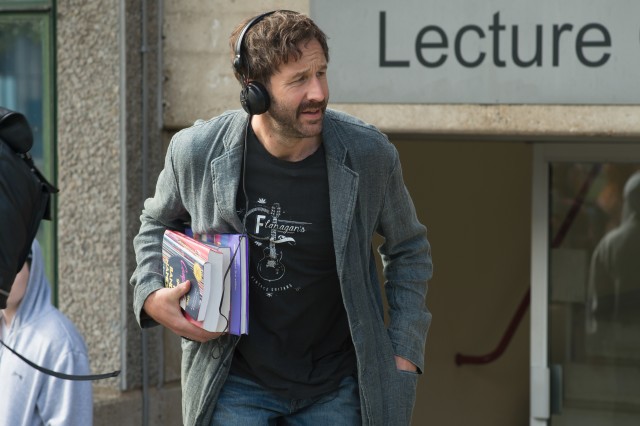Juliet, Naked Movie Review
 |
Juliet, Naked
Theatrical Release: August 17, 2018 / Running Time: 105 Minutes / Rating: R Director: Jesse Peretz / Writers: Nick Hornby (novel); Evgenia Peretz, Jim Taylor, Tamara Jenkins (screenplay) Cast: Rose Byrne (Annie Platt), Ethan Hawke (Tucker Crowe), Chris O'Dowd (Duncan Thomson), Jimmy O. Yang (Elliot), Megan Dodds (Carrie), Ayoola Smart (Lizzie Crowe), Azhy Robertson (Jackson Crowe) |
The title Juliet, Naked may conjure some artsy, risquι European drama that arrives here having made shockwaves and won festival prizes around the world. In fact, though, this British-American movie hails from a 2009 book by Nick Hornby (About A Boy, High Fidelity) At the film's start, our attentions are on Annie Platt (Rose Byrne) and Duncan Thomson (Chris O'Dowd). The strain of this couple's long-term relationship is pretty clear to us. A media studies professor by trade, Duncan's real passion lies in maintaining and moderating a fan community devoted to Tucker Crowe (Hawke), a briefly iconic rock singer-songwriter who suddenly left the spotlight in the 1990s at the height of his fame. Crowe left behind a small body of work that fans like Duncan endlessly and spiritedly dissect as well as a mystery-shrouded personal life for all to contemplate.
One rough day, Annie opens a package addressed to Duncan containing the titular Juliet, Naked, a newly-unearthed collection of stripped-down early recordings of Crowe's most famous album. Scolded by Duncan for listening to it before him, Annie proceeds to anonymously write an unfavorable review of the curious CD, which draws a mixed reaction on the forums but also an approving e-mail from the long-unseen Crowe himself.
This sparks an online pen palship between Annie and her soon-to-be-ex-boyfriend's hero. After Duncan confesses to having gotten close to a new colleague, the now-single Annie and Tucker Crowe's emails grow increasingly personal and meaningful. When Tucker flies to England to witness the birth of his first grandchild by the oldest of his scattered illegitimate children, it poses an opportunity for him to meet the woman he's been messaging and discover if there could be something there.
Juliet, Naked has its work cut out for it. E-mail relationships are tough to dramatize in a cinematic way. This inevitably will be measured up to You've Got Mail, a romcom whose late '90s AOL vibe is crucial to its now-nostalgic appeal. Crediting three screenwriters -- Tamara Jenkins (Slums of Beverly Hills), Jim Taylor (Alexander Payne's Sideways, About Schmidt, and Election co-scribe), and Evgenia Peretz (sister of director Jesse Peretz, collaborating again after 2011's underperforming yet likable Our Idiot Brother), Juliet does not pull off this early material with the most grace or ease.
And yet, it does pull it off, because you're still there invested in a love triangle which isn't quite as cut and dry as most romantic comedy dynamics are. In a lesser film, Duncan would be a completely loathsome scoundrel, but in addition to drawing the lion's share of the laughs with his flavorful characterization, O'Dowd makes him a sneakily sympathetic character you cannot hate. In contrast, Tucker Crowe is no white knight galloping to our heroine's rescue. He's a highly flawed father and man whose most attractive quality may be just how little regard he maintains his fringe-celebrated music career. Byrne, meanwhile, is, as always, an appealing presence, even when her character's judgment invites obvious questions. This top-billed role represents a somewhat rare chance for her to be a distinct leading lady and her ease in that role makes you wonder why she's so often asked to play second fiddle to Melissa McCarthy, singing orphans, and CGI rabbits.
Critical to the film's considerable charm is the casting of Hawke, who features just as prominently in 1990s pictures that Duncan features in his shrine to the vanished star as he does in present-day flesh. No other famous actor has that '90s young rock singer look that Hawke lent to films like Reality Bites and Before Sunrise and photos from that era give the musician a weight that the forgettable invented music itself does not. It helps that Hawke just kills the part as well, providing an impish, immature mid-40s presence and the very specific blend of incorrigibility and irresistability that the movie needs. It is very easy to imagine the same screenplay falling completely flat with any casting change to the three lead actors. One also has to admire the way that Judd Apatow, who has had as much impact on big screen comedy this century as anyone else, has kind of reinvented himself from big mainstream raunchfests to more human comedies like this and last year's delightful The Big Sick. Whether it's in response to his protιgιs no longer needing his backing, audiences growing tired of his signature brand of improv-driven comedy, or simply him wanting to stretch his creative muscles, the shift seems to suit Apatow well and should extend his career.
Seven months after premiering at Sundance, Juliet, Naked opened in four coastal theaters. It has now expanded to over 300, where it should hopefully find an audience as the change of seasons welcomes a better class of films.
|
Related Reviews:
DVDizzy.com | DVD and Blu-ray Reviews | New and Upcoming DVD & Blu-ray Schedule | Upcoming Cover Art | Search This Site
DVDizzy.com Top Stories:
Directed by Jesse Peretz: Our Idiot Brother
Produced by Judd Apatow: The Big Sick Anchorman: The Legend of Ron Burgundy Begin Again Popstar: Never Stop Never Stopping
Rose Byrne: I Give It a Year The Meddler Adult Beginners Annie
Ethan Hawke: First Reformed Maggie's Plan Boyhood Before Midnight The Phenom Maudie Valerian and the City of a Thousand Planets
Chris O'Dowd: The Sapphires St. Vincent Friends with Kids Gulliver'S Travels
Now in Theaters: The Happytime Murders Crazy Rich Asians Searching The Little Stranger Don't Worry, He Won't Get Far on Foot
Text copyright 2018 DVDizzy.com. Images copyright 2018 Lionsgate, Roadside Attractions, Los Angeles Media Fund, Rocket Science, Bona Fide, Apatow Company, Turnlet Films.
Unauthorized reproduction prohibited.

